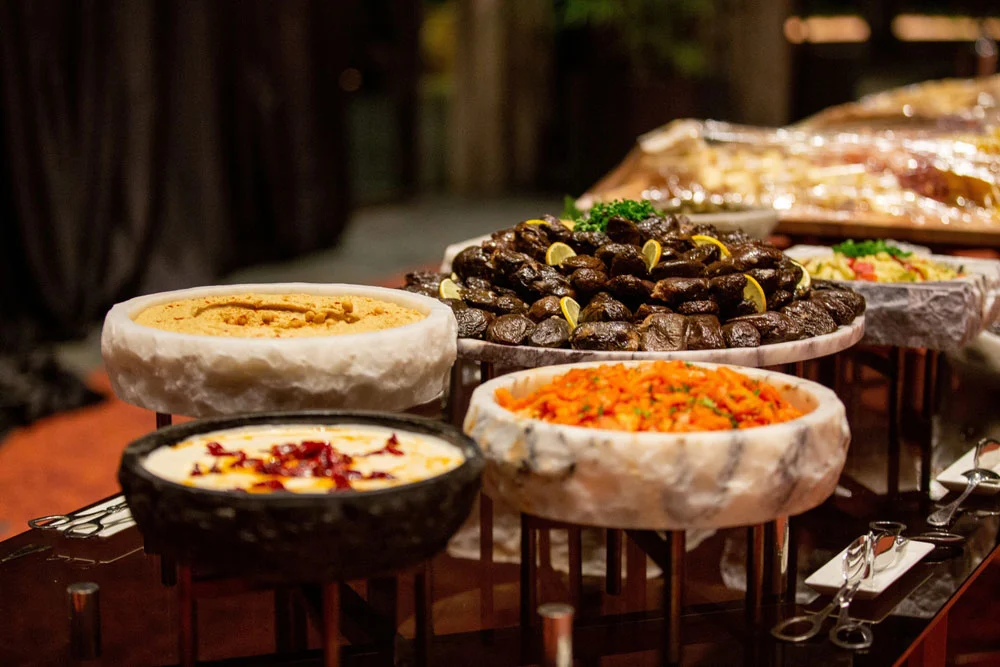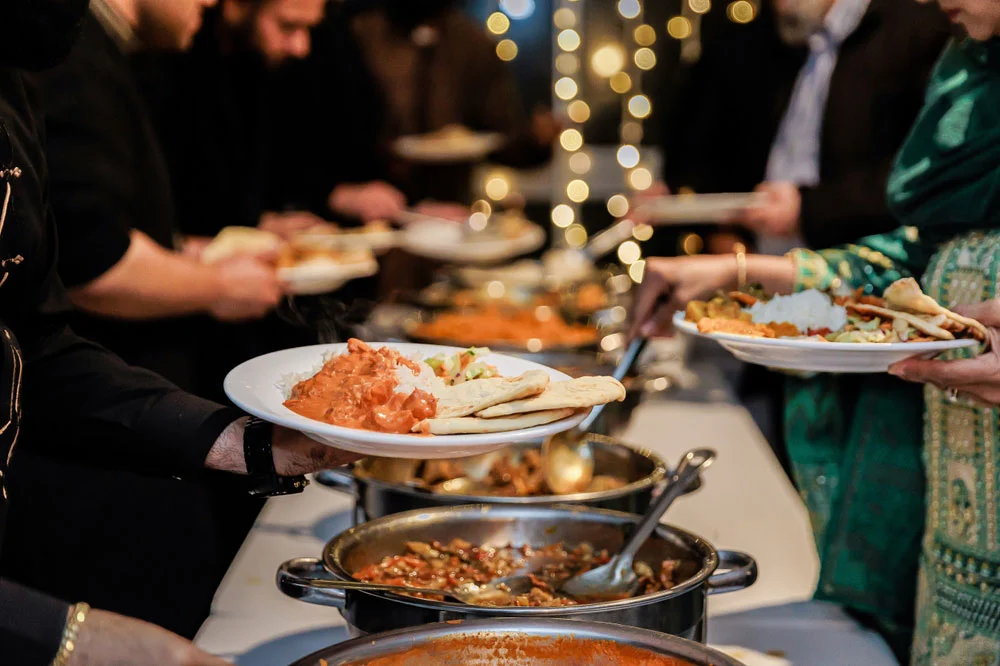In Islam, ‘Walima’ signifies the celebratory wedding banquet after the marriage ceremony. Imagine a scene in the warm glow of happiness and love where family and friends gather to celebrate a union. This scene is what the concept of ‘Walima’ encapsulates in Islamic culture.
It’s a significant event that marks the start of a new chapter in the lives of the newlyweds. The Walima holds a special place in Islamic traditions as it’s seen as a way to bring joy and blessings to the newly married couple.
The Walima is more than just a meal; it reflects the love and support surrounding the couple as they take their first steps into married life. It signifies the beginning of a shared life filled with happiness, love, and prosperity.
Prove of Walima in Islam According to Sunnah
Muslim Life Partner?
In Islamic teachings, the practice of Walima is substantiated through the Sunnah, which guides post-wedding celebrations. The Sunnah emphasizes the importance of conducting a Walima feast after marriage. Narrated Anas:
“When Allah’s Messenger (ﷺ) married Zainab bint Jahsh, he made the people eat meat and bread to their fill (by giving a Walima banquet). Then he went out to the dwelling places of the mothers of the believers (his wives), as he used to do on the morning of his marriage…” [Sahih al-Bukhari, 4794]
Also, Narrated Ibn Mas’ud (RA):
“Allah’s Messenger (ﷺ) said: “The food of Walima on the first day is a duty, that on the second day is a Sunnah, while the third is showing off. Whoever (does something) to show-off, Allah will expose him (in the Hereafter).” [Reported by at-Tirmidhi who considered it Gharib (transmitted through a single narrator)]. [It is incorrectly claimed that] its narrators are those who are reported from in the Sahih (collection of al-Bukhari)].” [Sunnah.com reference: Book 8, Hadith 92]
It is also Narrated by Anas:
“The Prophet (ﷺ) stayed for three days at a place between Khaibar and Medina, and there he consummated his marriage with Safiyya bint Huyay. I invited the Muslims to a banquet that included neither meat nor bread. The Prophet (ﷺ) ordered for the leather dining sheets to be spread, and then dates, dried yogurt, and butter were provided over it, and that was the Walima (banquet) of the Prophet…” [Sahih al-Bukhari, 5159]
What is the Purpose of Walima?

The purpose of Walima in Islamic tradition extends beyond just celebrating marriage, also encompassing the marking of significant life events such as the birth of a newborn or the acquisition of a new home.
Walima serves as a way to bring together family, friends, and community members to share in the joy of these milestones. It’s a time of celebration and gratitude, where individuals express thanks for blessings received and seek blessings for the future.
Furthermore, Walima symbolizes unity and solidarity within the community. By coming together to celebrate these momentous occasions, individuals strengthen their bonds with one another and foster a sense of belonging.
How Is Walima Celebrated in Islam?
When celebrating Walima in Islam, the event’s timing holds significant importance. It can occur simultaneously with the Nikah, after the Nikah but before consummation, or at the time of the wedding itself.

At the Same Time as the Nikah
Typically, alongside the Nikah ceremony, the Walima celebration in Islam is a significant event to mark the newlywed couple’s union and is an essential part of the marriage process.
It’s a joyous occasion where family and friends come together to celebrate the marriage, offer blessings, and share in the newlyweds’ happiness.
After the Nikah, but Before the Consummation of the Marriage
Celebrated in Islam after the Nikah ceremony but before the finalization of the marriage, the Walima holds a special significance in marking the union of the newlywed couple. This feast is a joyful occasion for family, friends, and community members to celebrate the marriage.
The Walima is considered a Sunnah and a way for the newly married couple to seek the blessings of Allah. It symbolizes the beginning of their life together as husband and wife. The event typically involves a large meal or banquet hosted by the groom’s family, where guests are invited to share in the happiness of the marriage.
At the time of the Wedding
Following the Nikah ceremony and before the consummation of the marriage, the Walima in Islam is observed as a significant event that symbolizes the union of the newlywed couple.
The Walima isn’t just a feast; it holds deep cultural and religious significance in Islam. It showcases the couple’s commitment and the community’s support for their union.
The event typically involves a lavish meal, during which guests are invited to partake in the festivities, share in the couple’s happiness, and offer their prayers for a prosperous and blessed marriage ahead.
When should Walima be done in Islam?
In Islam, the Walima feast is typically scheduled after the nikah ceremony. The Messenger of Allah recommends that it be held on the first day following the marriage ritual. This timing is considered auspicious and closely follows the Sunnah.
As Narrated by Ibn Mas’ud (RA):
“Allah’s Messenger (ﷺ) said: “The food of Walima on the first day is a duty, that on the second day is a Sunnah, while the third is showing off. Whoever (does something) to show-off, Allah will expose him (in the Hereafter)…”
While the preferred timing is the day after the nikah, holding the Walima within two days of the marriage ceremony is acceptable if there are valid reasons. However, after these two days, a feast would no longer be deemed a Walima in Islamic tradition’s eyes.
Adhere to this timeframe to ensure that the Walima holds its significance and fulfills its purpose within the prescribed Islamic guidelines. By following this recommended timeline, you honor the Sunnah and partake in a joyous celebration that marks the beginning of a new chapter in your life with blessings and gratitude.
How Long Does a Walima Last?
Walima celebrations often extend beyond the typical duration of other wedding festivities, with some lasting up to two days. This extended timeline allows for a more elaborate and leisurely celebration, providing ample time for the families and guests to come together, socialize, and enjoy the festivities.
The first day of the Walima usually involves the formal reception and dinner, where the newlyweds are officially presented to the community. This is often a grand affair with elaborate decorations, delicious food, and lively entertainment.
Who Should Pay for the Walima Arrangement?
It is considering who should bear the expenses for a Walima celebration. Well, according to scholarly consensus, it is the responsibility of the groom’s side to organize, host, and cover the costs of the Walima.
Who Should be Invited to the Walima?
When deciding the guest list for the Walima, the Quran provides clear guidance – friends, relatives, and neighbors are the primary invitees. However, the guest list should also include a broad spectrum of other family members, associates, and virtuous individuals from your community.
It’s also often considered beneficial to invite scholars to your wedding. However, one thing to be wary of is that the Quran cautions against inviting only the affluent or so-called ‘upper crust’ of society, as the Walima should be an inclusive celebration.
Embracing the Spirit of Walima: Celebrating Love, Community and Shared Prosperity
In Islamic culture, Walima is a beautiful representation of community, love, and shared prosperity. It is not merely a wedding banquet but a profound ritual celebrating the precious union of two lives.
A unique event that signifies the start of a joyful shared journey, Walima is a testament to the strong bonds of happiness, love, and blessings that permeate the lives of newly married couples.
Like a delicious feast that brings people together in celebration, the Walima reminds us of the importance of community support, compassion and generosity in married life.
- What Is Nikah (Nikkah) In Islam? - June 12, 2024
- Walima Meaning | Everything You Need To Know - June 10, 2024
- Muzmatch Vs Salams | Differences You Should Know - June 5, 2024
